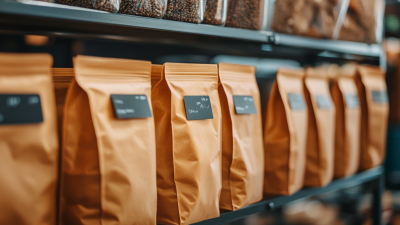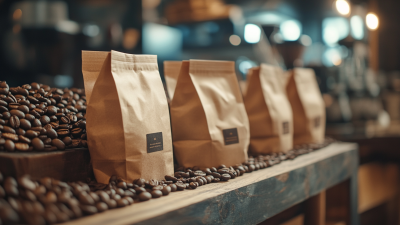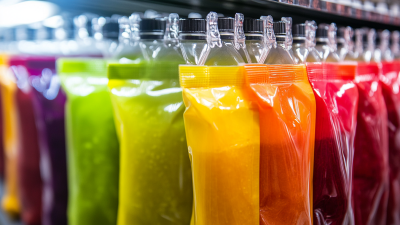- Phone:+86 15218629499
- Phone: +86 15766990063
- E-mail: Yzprinting01@163.com
In today's competitive market, the importance of selecting the right packaging materials cannot be overstated, particularly when it comes to Pouch Plastic Bags. According to a report by Global Market Insights, the demand for flexible packaging solutions, including pouch bags, is projected to surpass USD 300 billion by 2024, driven by the growing need for lightweight, versatile, and cost-effective packaging options across various industries.

Pouch Plastic Bags stand out due to their ability to preserve product freshness and enhance shelf appeal, making them an essential consideration for businesses aiming to optimize their packaging strategies. As consumer preferences shift towards convenience and sustainability, understanding the diverse applications and sourcing aspects of Pouch Plastic Bags becomes crucial for any business looking to thrive in this evolving landscape.
When sourcing pouch plastic bags for your business, it’s essential to consider several key factors to ensure you make the right choice. First, evaluate the material of the bags. Common options include polyethylene and polypropylene, each offering different levels of durability and flexibility. For products that require added protection, consider using bags with a thicker gauge or those that are multi-layered for enhanced barrier properties.
**Tip:** Always request samples before making a bulk purchase to assess the material quality and performance.
Next, think about the size and shape of the pouch bags. A well-fitted bag not only enhances product presentation but also minimizes waste. Custom sizes might be necessary based on your product dimensions. Additionally, consider the closure types, such as zip-lock or heat seal, which could impact the usability and shelf life of your products.
**Tip:** Analyze your average product size and volume to determine the most efficient bag dimensions to reduce costs and improve packaging efficiency.
Lastly, don’t overlook the design and branding opportunities that pouch bags can provide. A visually appealing bag can greatly influence consumer perception. Choose options that allow for high-quality prints or unique finishes that align with your brand identity.
**Tip:** Invest time in designing eye-catching graphics that tell your brand story and appeal to your target market.
When it comes to sourcing pouch plastic bags for your business, understanding the different types available is crucial for meeting your specific needs.
 Stand-up pouches, for instance, are particularly popular for packaging food products. Their ability to self-stand on shelves not only enhances visibility but also simplifies storage, making them an ideal choice for retailers. These pouches are often designed with a resealable zipper, making them user-friendly and helping to maintain product freshness.
Stand-up pouches, for instance, are particularly popular for packaging food products. Their ability to self-stand on shelves not only enhances visibility but also simplifies storage, making them an ideal choice for retailers. These pouches are often designed with a resealable zipper, making them user-friendly and helping to maintain product freshness.
On the other hand, flat pouches are excellent for non-food items, such as cosmetics and electronics. Their sleek design allows for efficient packing and easy stacking, optimizing shelf space. Additionally, you may consider barrier pouches, which provide superior protection against moisture, oxygen, and light, making them perfect for sensitive products. By selecting the right type of pouch plastic bag, your business can improve packaging efficiency, enhance product visibility, and ultimately drive sales.
When sourcing pouch plastic bags for your business, understanding the different types of plastics available and their durability is crucial. Traditional plastics like polyethylene (PE) and polypropylene (PP) are widely used due to their resilience and versatility. However, emerging materials like thermoplastic polyurethane (TPU) are gaining traction for specific applications, offering enhanced durability and flexibility. For instance, recent studies show that TPU inner tubes can withstand punctures better than their conventional counterparts, making them a reliable choice for businesses that require robust packaging solutions.
On the sustainability front, consider exploring bioplastics derived from renewable resources. Research indicates that bioplastics can significantly reduce the carbon footprint compared to traditional plastics, making them an environmentally friendly alternative for food packaging and other applications. Furthermore, integrating recycled plastics into products has shown to improve the long-term performance of materials, as demonstrated by studies on porous asphalt pavement that revealed that mixtures incorporating recycled plastics performed better than those without.
Tips: When selecting materials for pouch plastic bags, prioritize those that are not only durable but also sustainable. Investigating suppliers that utilize recycled or bioplastic materials can enhance your brand's eco-friendly image. Additionally, ensure that the chosen material aligns with industry regulations to avoid potential compliance issues in the future.
When sourcing pouch plastic bags for your business, a crucial aspect to consider is the balance between quality and affordability. According to a recent market analysis by Research and Markets, the global plastic pouch packaging market is projected to reach $53.44 billion by 2027, growing at a CAGR of 7.6%. This booming demand reflects the increasing preference for flexible packaging solutions due to their convenience and cost-effectiveness. However, procuring high-quality pouches at a reasonable price requires a strategic approach.
Cost analysis plays a pivotal role in this process. A study published by Smithers Pira suggests that companies can save up to 20% on packaging costs by opting for high-quality materials that reduce wastage and enhance shelf life. Investing in better quality pouch bags may seem like a higher upfront expense, but it often results in long-term savings through reduced damages and returns. Furthermore, evaluating suppliers based on their manufacturing processes and sustainability practices can yield additional cost benefits. A well-informed sourcing strategy aligns quality with affordability, ultimately enhancing brand reputation and consumer satisfaction.
When it comes to sourcing pouch plastic bags for your business needs, supplier comparison is a crucial step in making informed decisions. A recent report from Smithers Pira indicates that the global flexible packaging market is expected to grow at a CAGR of 4.6% from 2020 to 2025, reaching an estimated $250 billion. This growth underscores the increasing importance of selecting the right suppliers for pouch plastic bags, as their quality and sustainability can significantly impact your brand's reputation and bottom line.
In evaluating potential suppliers, consider critical factors such as material quality, production capabilities, and sustainability practices. According to The Freedonia Group, 58% of packaging decision-makers cite environmental concerns as a top priority in their sourcing decisions. Suppliers that prioritize eco-friendly materials and innovative processes will not only help you meet regulatory requirements but also resonate with increasingly eco-conscious consumers. By conducting a thorough comparison based on these criteria, businesses can better align their packaging needs with suppliers that contribute positively to their operational and sustainability goals.







